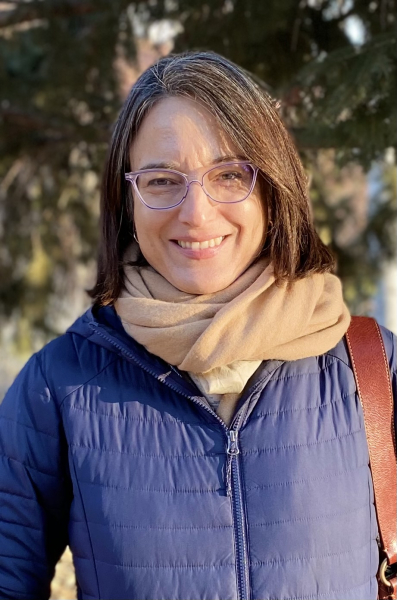Associate Professor
About
Role:
FacultyPosition:
- Associate Professor
Concentration:
- Comparative Government and Politics, Latin America
Department:
- Political Science
Education:
- Ph.D. Boston University
Biography
I teach in the areas of comparative government, Latin America, and environmental politics. My research interests include ethnic politics, ethnic social movements and local governance, territorial politics, environmental justice, and institutional change in Latin America in general and Colombia in particular.
Publications
Section
Velasco, Marcela. 2023. Collective Trauma in Indigenous and Black Territories on Colombia's Pacific Coast: A Framework and Collaborative Approach to Researching Violence. Territory, Politics, Governance.
Velasco, Marcela. 2022. Perspectivas locales sobre los territorios étnicos después del Acuerdo de Paz. Lecciones de una investigación colaborativa para la paz ambiental (Local perspectives on ethnic territories after the Peace Agreement. Lessons from collaborative research for environmental peace). In Ángela María Amaya Arias, Kristine Perry, Erika Weinthal, eds. Gobernanza ambiental para la paz en Colombia. Duke University, Universidad Externado, Environmental Law Institute.
Velasco, Marcela. 2021. Indigenous Social Movements and Institutional Reform: Mechanisms of Interest Representation in Three Colombian Municipalities. Latin American Perspectives. (48) 6: 85–104.
Velasco, Marcela with Colectivo de Trabajo Jenzera & Escuela Interétnica. 2021. Resistencia y adaptación en el Pacífico colombiano: Una mirada desde nuestras comunidades al territorio, los gobiernos propios, el medio ambiente y la economía. Bogotá. Jenzerá.
Velasco, Marcela and Stephen Mumme. 2021. Environmental capacities in Latin America: a comparison of Brazil, Chile, and Mexico. The Social Science Journal.
Velasco, Marcela. 2021. Modernization and Culture in García Márquez’s Caribbean. Oxford Handbook of Gabriel García Márquez, in Bell-Villada, Gene and Ignacio Lopez-Calvo, eds. Oxford University Press.
Velasco, Marcela. 2018. Multiculturalism, Legal Pluralism and Local Government in Colombia: Indigenous Autonomy and Institutional Embeddedness in Karmata Rúa, Antioquia. Journal of Latin American Studies 50 (3): 517 - 547.
Velasco, Marcela. 2016. Territory and Territoriality in Colombian Politics. Contextualizaciones Latinoamericanas (15), 19.
Velasco, Marcela. 2015. Injustice and Organization in Anchicayá, Colombia: An Environmental Legal Case in a Hydropower Watershed. Local Environment: The International Journal of Justice and Sustainability.
Velasco, Marcela. 2015. Social Movement Contention in Colombia: 1958-2010. In Almeida, Paul and Allen Cordero, eds. Handbook of Social Movements across Latin America. Springer. Translated by CLACSO to Spanish in 2017.
2014. The Territorialization of Ethno-political Reforms in Colombia: Chocó as a Case Study. Latin American Research Review 49(3): 126-152
Velasco, Marcela. 2011. Democracy, Governance and Social Movements in Colombia: 1990-2006. In Tanaka and Jácome, eds. Challenges to Democratic Governance: Political and Institutional Reforms and Social Movements in the Andean Region. Translated by Jane Guppy and Gordon Hart. Lima: IEP, IDRC, IVESP, 183-210.
Courses
-
POLS 442: Environmental Politics in the Developing World
SyllabusThe course evaluates environmental politics in developing countries or nations characterized by rapid social change, high levels of poverty, and inequality. Students will analyze issues of environmental governance, sustainable development, institutional change, and environmental justice. The course assesses the tensions that exist between development and conservation and considers diverse perspectives on development. It also examines environmental policy under different regimes and identifies efforts to increase the state’s environmental capacities. The class concludes with a focus on environmental justice and civil society demands for more sustainable models of development.
-
POLS 441: Comparative Indigenous Politics in the Americas
SyllabusThis course compares the relationship between states and Indigenous peoples throughout the Americas. It examines their claims to self-determination, territoriality, and multicultural rights, and explores national and international laws that address Indigenous peoples’ rights. Some of the questions the seminar will address include (1) the politics of Indigenous identities and self-identification processes, (2) how Indigenous people organize and transform local and national politics, (3) how Indigenous movements and political parties adapt to or contest national policies and politics, (4) how these movements reshape democratic politics, and (5) how they challenge prevailing views and practices of economic development and the relationship between people and the natural environment.
